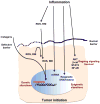Inflammation and colorectal cancer: colitis-associated neoplasia
- PMID: 23161445
- PMCID: PMC3568220
- DOI: 10.1007/s00281-012-0352-6
Inflammation and colorectal cancer: colitis-associated neoplasia
Abstract
Connection between inflammation and cancer is a rapidly developing field. Epidemiological data suggests that inflammation along with distinct arms of host immune system plays a very important role in the development and progression of many different cancers. Inflammatory bowel disease (IBD) is an important risk factor for the development of colon cancer, namely, colitis-associated cancer (CAC). The molecular mechanisms by which inflammation promotes cancer development are still being uncovered and may differ between CAC and other forms of colorectal cancer. Recent work has shed light on the role of distinct immune cells, cytokines, and other immune mediators in virtually all of the steps of colonic tumorigenesis, including tumor initiation and promotion as well as progression and metastasis. The close proximity of colonic tumors to the myriad of intestinal microbes, as well as instrumental role of microbiota in IBD, introduces microbes as new players capable of triggering inflammation and possibly promoting tumorigenesis. Various mechanisms of CAC tumorigenesis as well as new possible hints for the future approaches for prevention and therapy are discussed in this review.
Figures


References
-
- Tenesa A, Dunlop MG. New insights into the aetiology of colorectal cancer from genome-wide association studies. Nat Rev Genet. 2009 - PubMed
-
- Rustgi AK. The genetics of hereditary colon cancer. Genes Dev. 2007;21:2525–2538. - PubMed
-
- Feagins LA, Souza RF, Spechler SJ. Carcinogenesis in IBD: potential targets for the prevention of colorectal cancer. Nat Rev Gastroenterol Hepatol. 2009;6:297–305. - PubMed
-
- Saleh M, Trinchieri G. Innate immune mechanisms of colitis and colitis-associated colorectal cancer. Nat Rev Immunol. 2011;11:9–20. - PubMed
Publication types
MeSH terms
Grants and funding
LinkOut - more resources
Full Text Sources

